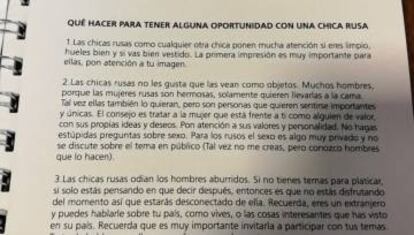Argentine soccer association hands out advice on how to pick up Russian women
The controversial text was included on a course for sports journalists ahead of this summer’s World Cup tournament in the country


“Russian women don’t like it when you look at them like objects.” “They pay a lot of attention to whether you’re clean, smell good and are well dressed.” “They hate boring men.” Those are just some of the pieces of advice dished out in a manual covering Russian language and culture that was distributed on Tuesday by the Argentine Football Association (AFA) to around 40 sports journalists.
When they leafed through the material they had been given, the students who had signed up to the workshop found a section entitled: “What to do to have a chance with a Russian girl.” With a mixture of surprise and indignation, some of the students took pictures of the text and posted them on social networks, creating something of a scandal.
The AFA has since confirmed to EL PAÍS that the controversial material did indeed exist, but explained that it was taken out of circulation several days ago by the department of education and never got into the hands of students. According to their version, the manual was created by a “third party, outside of the AFA, who lived in Russia for many years.”
Muy moderno el manual de estilo de la AFA sobre el Mundial pic.twitter.com/aWT4FrfCie
— Nacho Catullo (@nachocatullo) May 15, 2018
“The AFA style model about the World Cup is very modern.”
Other pieces of advice contained in the viral manual included: “Treat the woman you have in front of you like someone of value, with their own ideas and desires.” And: “Pay attention to their values and personality;” as well as: “Don’t ask stupid questions about sex.” The second of the eight-point list stated: “Many men, given that Russian women are beautiful, just want to take them to bed. Perhaps they want to too, but they are people who want to feel important and unique.”
“I have never seen anything so crude in an institutional environment,” Nacho Catullo, the first person to tweet out the contents of the manual, told EL PAÍS. His social media post was soon retweeted by more than 2,000 people.
Of the nearly 40 journalists who attended the course there were only three women, but that didn’t stop many of the male attendees from being shocked to find such an “outdated and distasteful” text in the manual, in the words of Catullo.
Another of the recommendations was to not get upset should they find “girls who only pay attention to material things.” “Don’t worry about this,” the text stated. “There are many pretty girls in Russia and they are not all good for you. Be selective.”
The scandal illustrates the rapid cultural change that Argentina has been living through since the appearance of major feminist movements
Given the avalanche of criticism, personnel from the AFA interrupted the course, and removed the text books without offering explanations. A few minutes later they were returned, with the controversial page torn out. But it was too late.
The scandal illustrates the rapid cultural change that Argentina has been living through since the appearance of major feminist movements, in particular among the younger generations. Singers, journalists, soccer players and other celebrities have been the object of recent scorn for sexist comments that, just a few years ago, would have passed by unnoticed.
The students reported that to begin with, the teacher of the course, Eduardo Pennisi, did not understand what was going on. When one of the attendees spoke to him about the controversy that had been stirred up on social networks, he argued that the material did not appear to him to be neither obscene nor sexual. The guide had been included to make the class “more fun,” reported Leonardo Paradizo, who was also in attendance.
The three-hour course was given at the headquarters of the AFA in Buenos Aires. The advice had not been written by the teacher but rather lifted from a blog entitled “Amar está en ruso” (To love is in Russian), as people have since pointed out online.
English version by Simon Hunter.
Tu suscripción se está usando en otro dispositivo
¿Quieres añadir otro usuario a tu suscripción?
Si continúas leyendo en este dispositivo, no se podrá leer en el otro.
FlechaTu suscripción se está usando en otro dispositivo y solo puedes acceder a EL PAÍS desde un dispositivo a la vez.
Si quieres compartir tu cuenta, cambia tu suscripción a la modalidad Premium, así podrás añadir otro usuario. Cada uno accederá con su propia cuenta de email, lo que os permitirá personalizar vuestra experiencia en EL PAÍS.
¿Tienes una suscripción de empresa? Accede aquí para contratar más cuentas.
En el caso de no saber quién está usando tu cuenta, te recomendamos cambiar tu contraseña aquí.
Si decides continuar compartiendo tu cuenta, este mensaje se mostrará en tu dispositivo y en el de la otra persona que está usando tu cuenta de forma indefinida, afectando a tu experiencia de lectura. Puedes consultar aquí los términos y condiciones de la suscripción digital.








































